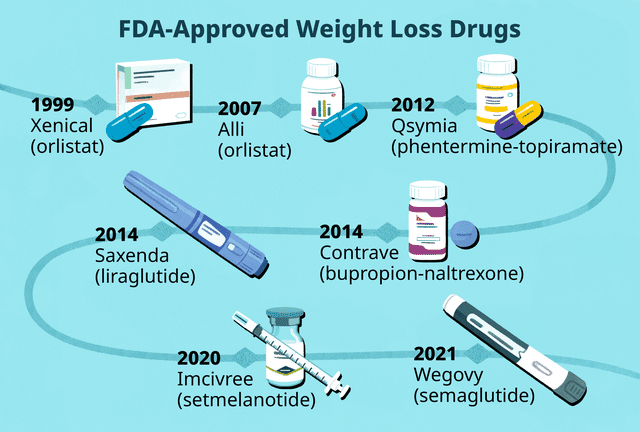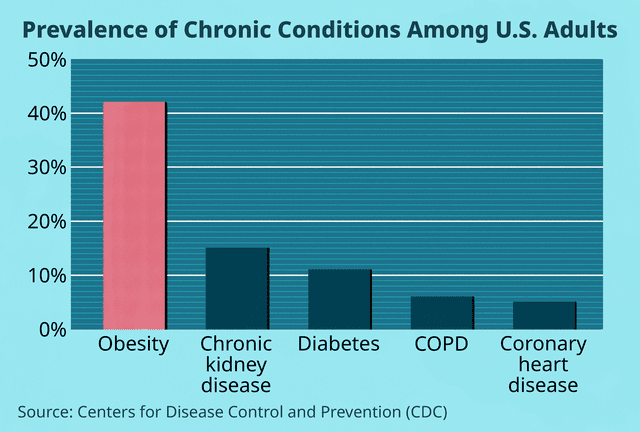What's New in Obesity Treatment?

Illustration by Mira Norian for Verywell Health
Ozempic and Mounjaro are drugs that can be used to treat type 2 diabetes. But you’ve likely heard of them because they’re all over the news for weight loss.
Ozempic, Mounjaro, Wegovy, Zepbound, and Saxenda are in a newer class of drugs called GLP-1 agonists. These once-weekly injectable medications are currently the most effective diabetes and weight management medications available, leading to an average weight loss of 6% to 20% depending on the drug. But only Wegovy, Zepbound, and Saxenda are approved specifically for weight loss.
Research shows that some of these drugs also lower the risk of heart and kidney disease. They work quite differently from most of the weight loss drugs that have come before them by suppressing appetite, slowing digestion, and making patients feel full faster.

Illustration by Mira Norian for Verywell Health
GLP-1 agonists are not without side effects. Because of how they work, common side effects include nausea, vomiting, diarrhea, and constipation.
The demand for these drugs increased after celebrities on social media described taking them and losing weight rapidly. Initially, this led to a shortage of Wegovy. As a result, people began taking Ozempic off-label instead, even though they did not have type 2 diabetes.
Supply chain issues still exist today for these medications. Insurance companies have become more strict when it comes to covering the drugs, rejecting claims even for patients with diabetes already on the drug.
It's important to remember that the hype is warranted. Medications like semaglutide, which makes up both Ozempic and Wegovy, are both effective and necessary—over 40% of adults in the U.S. have obesity and another 30% have overweight. Their rising popularity is paving a way for a new era of weight loss drugs, and hopefully, access to these drugs.
Here’s what you need to know.
— Kelly Wood, MD, endocrinologist and Verywell Health Medical Expert Board member

Illustration by Mira Norian for Verywell Health
Types of Obesity Treatment
Overweight vs. Obesity
Overweight and obesity are both conditions recognized by the Centers for Disease Control and Prevention (CDC).
Overweight: A person has a body mass index (BMI) of 25.0 to 29.9 kg/m2. (Normal BMI is between 18.5 and 24.9.)
Obesity: A person has a BMI of 30.0 or greater. A BMI of 40.0 or greater is often referred to as severe obesity.
While these differences matter for medical purposes, like who is eligible for certain medications or bariatric surgery, they don’t take into account anything other than BMI. Many experts are now looking beyond the BMI for insights into defining obesity—and how to treat it.
Frequently Asked Questions
Who is eligible for medication to treat obesity?
Weight management medications should only be used in combination with lifestyle therapy (a healthy meal plan, physical activity, and behavioral interventions) and not alone. This combination is recommended for individuals with a BMI over 30 (obesity), or individuals with both a BMI of 27 (overweight) or greater with a weight related health problem such as hypertension or diabetes.
Which medications are approved for obesity and weight management?
To date, the FDA has approved eight medications for weight management. Xenical (orlistat), Alli (orlistat), Qsymia (phentermine-topiramate), Contrave (bupropion-naltrexone), Saxenda (liraglutide), Imcivree (setmelanotide), Wegovy (semaglutide), and Zepbound (tirzepatide).
How are so many people acquiring drugs like Ozempic for weight loss?
Insurance companies are no longer covering Ozempic for weight loss. Patients who do not have diabetes are getting compounded semaglutide from various health or weight loss clinics. This may have different active ingredients than the approved version of the drug. Patients should be aware that the safety and efficacy of these unregulated sources have not been tested.
What's Next For Weight Loss Drugs?
Navigating Access Issues
Ask the Expert
As an endocrinologist, what is your experience with newer weight loss drugs like semaglutide?
Dr. Wood: Even though semaglutide has only become popular in the public sphere over the past year or two, these types of medications, called GLP-1 agonists, have been used in the treatment of type 2 diabetes since 2005. They are very effective in lowering blood sugar. As a byproduct, they lead to significant weight loss. Weight loss varies depending on which GLP-1 drug is used, as well as the dosage. These medications have been game-changers for many of my patients who are now able to manage their diabetes. Many of them are even getting off insulin.
Have drug shortages or drug costs been a challenge for your diabetes patients?
Dr. Wood: Due to the drug shortage created by the off-label use of semaglutide and other GLP-1 agonists, these medications have been unavailable to my patients with diabetes, sometimes for months. As a result, patient blood sugars which were once well-managed became out of control. Insurance companies are also now extremely strict in terms of paying for the medications and have been denying many of the scripts. My office now has a pharmacy team dedicated to doing prior authorizations for these meds.
Do you think Ozempic will ever be FDA-approved for weight loss?
Dr. Wood: I think Ozempic (semaglutide) will remain approved only for type 2 diabetes. Semaglutide at even higher doses is already approved for weight loss under the name of Wegovy. I expect other weight loss medications using the GLP-1 agonist mechanism of action, or GLP-1 in combination with other drugs, to come through the pipeline soon.
Risks & Side Effects
Read the original article on Verywell Health.

